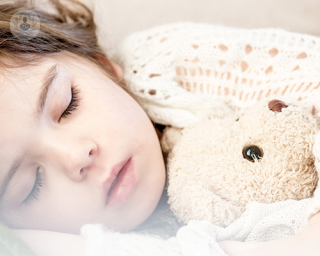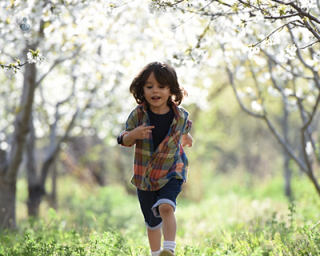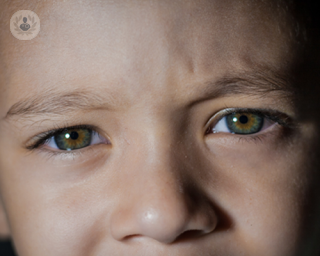What is asthma in children?
Asthma is a common pulmonary condition that often begins during childhood. The lungs and airways become inflamed and produce mucus when exposed to certain triggers. Common triggers include allergies, colds and exercise.

What are the symptoms?
- Difficulties breathing or shortness of breath
- Tightness in the chest
- Congestion
- Intermittent coughing
- Wheezing and a high-pitched sound when exhaling
Some symptoms may worsen at night, get worse over time or worsen with seasonal changes.
Other, less obvious symptoms can include:
- Trouble breathing when exercising
- Trouble sleeping caused by coughing, wheezing or breathing difficulties
- Delayed recovery from bronchitis or a respiratory infection
How can it be diagnosed?
It can be difficult to diagnose your child’s asthma. Bouts of coughing and wheezing could also be signs of a different respiratory problem. Doctors will look at the child’s medical history, symptoms, allergies and ask questions about their breathing, how long symptoms last and how often they occur.
Diagnostic tests might include the following:
- Blood test; to look for elevated numbers of white blood cells that indicate that an infection is present
- Chest x-ray; to reveal changes in the lungs when asthma is severe
- Allergy test; a skin or blood test to indicate that your child is allergic to a specific allergen
You should take your child to the doctor if they display symptoms like those mentioned above; constant coughing, wheezing, breathlessness, tightness in the chest and repeated episodes of chest infections.
Seek emergency medical help if your child:
- Has trouble breathing suddenly
- Is using their abdominal muscles to breathe
- They have an increased heartbeat
- Are sweating and experiencing chest pain
What are the causes of asthma in children?
The exact cause of asthma is unknown, however, it is thought to be linked to a weak immune system. Other factors that are thought to play a role are genetics and environmental factors.
Some common triggers that set off symptoms of asthma include:
- Colds and respiratory infections
- Exposure to pollutants like tobacco smoke
- Allergens such as dust, pollen and pet dander
- Changes in the weather
- Physical activity
- Acid reflux
Can it be prevented?
To lower your child’s risk of developing asthma, you can take the following steps:
- Reduce their exposure to cigarette smoke
- Reduce their exposure to air pollution and asthma triggers as much as possible
- Ensure they follow a healthy diet and maintain a healthy weight
- Take them to see a doctor regularly
If your child suffers from acid reflux or heartburn, keep it under control, as this can worsen asthma symptoms.
How is asthma in children treated?
There is no cure for childhood asthma and symptoms may continue into adulthood. However, with treatment, symptoms can be kept under control, preventing further damage to the lungs. Some children may only require short term treatment with short-acting bronchodilators for immediate relief of symptoms if their asthma is mild and intermittent. However long term medication will be needed for children with recurring bouts of asthma. Long term medication to control the asthma is administered in the form of corticosteroid inhalers. The dosage may change over time, depending on the severity of your child’s symptoms.
Sometimes other treatments might accompany inhalers if they initially prove ineffective on the own, such as:
- Leukotriene modifiers; taken in chewable form or as a powder
- Long-acting beta agonists, which can be inhaled with the corticosteroid inhaler
- Cromolyn; a drug that can be inhaled along with the corticosteroids to reduce inflammation
- Oral corticosteroids; only taken when other medications have proved unsuccessful
Monitoring and recording your child’s asthma and symptoms and controlling asthma triggers, keeping the house dust free and clean and teaching your child what to do if they have an asthma attack are all very important to keeping asthma under control.
Asma en niños
What is asthma in children?
Asthma is a common pulmonary condition that often begins during childhood. The lungs and airways become inflamed and produce mucus when exposed to certain triggers. Common triggers include allergies, colds and exercise.

What are the symptoms?
- Difficulties breathing or shortness of breath
- Tightness in the chest
- Congestion
- Intermittent coughing
- Wheezing and a high-pitched sound when exhaling
Some symptoms may worsen at night, get worse over time or worsen with seasonal changes.
Other, less obvious symptoms can include:
- Trouble breathing when exercising
- Trouble sleeping caused by coughing, wheezing or breathing difficulties
- Delayed recovery from bronchitis or a respiratory infection
How can it be diagnosed?
It can be difficult to diagnose your child’s asthma. Bouts of coughing and wheezing could also be signs of a different respiratory problem. Doctors will look at the child’s medical history, symptoms, allergies and ask questions about their breathing, how long symptoms last and how often they occur.
Diagnostic tests might include the following:
- Blood test; to look for elevated numbers of white blood cells that indicate that an infection is present
- Chest x-ray; to reveal changes in the lungs when asthma is severe
- Allergy test; a skin or blood test to indicate that your child is allergic to a specific allergen
You should take your child to the doctor if they display symptoms like those mentioned above; constant coughing, wheezing, breathlessness, tightness in the chest and repeated episodes of chest infections.
Seek emergency medical help if your child:
- Has trouble breathing suddenly
- Is using their abdominal muscles to breathe
- They have an increased heartbeat
- Are sweating and experiencing chest pain
What are the causes of asthma in children?
The exact cause of asthma is unknown, however, it is thought to be linked to a weak immune system. Other factors that are thought to play a role are genetics and environmental factors.
Some common triggers that set off symptoms of asthma include:
- Colds and respiratory infections
- Exposure to pollutants like tobacco smoke
- Allergens such as dust, pollen and pet dander
- Changes in the weather
- Physical activity
- Acid reflux
Can it be prevented?
To lower your child’s risk of developing asthma, you can take the following steps:
- Reduce their exposure to cigarette smoke
- Reduce their exposure to air pollution and asthma triggers as much as possible
- Ensure they follow a healthy diet and maintain a healthy weight
- Take them to see a doctor regularly
If your child suffers from acid reflux or heartburn, keep it under control, as this can worsen asthma symptoms.
How is asthma in children treated?
There is no cure for childhood asthma and symptoms may continue into adulthood. However, with treatment, symptoms can be kept under control, preventing further damage to the lungs. Some children may only require short term treatment with short-acting bronchodilators for immediate relief of symptoms if their asthma is mild and intermittent. However long term medication will be needed for children with recurring bouts of asthma. Long term medication to control the asthma is administered in the form of corticosteroid inhalers. The dosage may change over time, depending on the severity of your child’s symptoms.
Sometimes other treatments might accompany inhalers if they initially prove ineffective on the own, such as:
- Leukotriene modifiers; taken in chewable form or as a powder
- Long-acting beta agonists, which can be inhaled with the corticosteroid inhaler
- Cromolyn; a drug that can be inhaled along with the corticosteroids to reduce inflammation
- Oral corticosteroids; only taken when other medications have proved unsuccessful
Monitoring and recording your child’s asthma and symptoms and controlling asthma triggers, keeping the house dust free and clean and teaching your child what to do if they have an asthma attack are all very important to keeping asthma under control.


Breathing difficulties while sleeping: how can I help my child?
Por Mr Christopher Pepper
2024-12-19
If children experience breathing difficulties while they sleep, they can suffer from a wide range of symptoms, as explained by consultant paediatric ENT surgeon Mr Christopher Pepper in his latest article below. Ver más


Asthma in children: Symptoms and diagnosis
Por Professor Helen Brough
2024-12-19
A persistent dry cough as well as breathing difficulties and wheezing can be a signs of allergic asthma in children. In this informative article, hgihly esteemed consultant paediatric allergist Dr Helen Brough expertly explains how asthma is diagnosed in very young children and how the condition differs in adults. Ver más


Common asthma triggers in children and ways to relieve them
Por Dr Tom C Dawson
2024-12-18
Asthma is a prevalent respiratory condition in children, causing airway inflammation and breathing difficulties. While asthma can’t be cured, identifying and managing triggers can significantly improve a child’s quality of life. Below, we explore some of the most common asthma triggers and effective ways to relieve symptoms. Ver más


How do I know if my child has asthma?
Por Dr Michael Markiewicz
2024-12-17
Asthma is an all-too common problem in adults and children alike. It can range from mild to serious, and this can be a particular worry for parents of young children who exhibit coughing, wheezing, or trouble breathing. Leading paediatrician Dr Michael Markiewicz explains how to diagnose asthma in children, what can trigger it, and more… Ver más
Doctores expertos en Asma en niños
-
Dr Mark Rosenthal
Neumología infantilExperto en:
- Bronquiolitis
- Trastornos del sueño
- Asma en niños
- Neumonía en niños
- Tos crónica
- Chest infection
-
Dr Ramnik Mathur
PediatríaExperto en:
- Reacciones alérgicas
- Neonatología
- Dolor abdominal
- Dolor de cabeza
- Asma en niños
- Eccema
-
Dr Bhupinder Singh Sihra
AlergologíaExperto en:
- Pruebas de alergia
- Asma en niños
- Anafilaxia
- Urticaria alérgica
- Enfermedades respiratorias
- Sibilancias
-
Professor Gideon Lack
Alergología infantilExperto en:
- Asma en niños
- Reacciones alérgicas
- Anafilaxia
- Inmunología
- Alergias alimentarias
- Alergia al polen
-
Dr Theofilos Polychronakis
PediatríaExperto en:
- Problemas respiratorios
- Tos crónica
- Trastornos del sueño
- Asma en niños
- Infección respiratoria
- Rinitis
- Ver todos

The Alexandra Hospital - part of Circle Health Group
The Alexandra Hospital - part of Circle Health Group
Mill Ln, Cheadle, SK8 2PX
No existe teléfono en el centro.
Si haces uso de este teléfono facilitado por TOP DOCTORS nos autorizas al tratamiento de tu teléfono para fines estadísticos y comerciales. Para más información, lee nuestra Política de Privacidad
Top Doctors

The Portland Hospital - part of HCA Healthcare
The Portland Hospital - part of HCA Healthcare
205 - 209 Great Portland St. W1W 5AH
No existe teléfono en el centro.
Si haces uso de este teléfono facilitado por TOP DOCTORS nos autorizas al tratamiento de tu teléfono para fines estadísticos y comerciales. Para más información, lee nuestra Política de Privacidad
Top Doctors

77 Wimpole Street
77 Wimpole Street
77 Wimpole Street, London. W1G 9RU
No existe teléfono en el centro.
Si haces uso de este teléfono facilitado por TOP DOCTORS nos autorizas al tratamiento de tu teléfono para fines estadísticos y comerciales. Para más información, lee nuestra Política de Privacidad
Top Doctors
-
The Alexandra Hospital - part of Circle Health Group
Mill Ln, Cheadle, SK8 2PX, CheadleExperto en:
- Cadera
- Cardiología
- Hombro y codo
- Pediatría
- Pie y tobillo
- Rodilla
-
The Portland Hospital - part of HCA Healthcare
205 - 209 Great Portland St. W1W 5AH, Central LondonExperto en:
- Cirugía neurológica espinal
- Cirugía ortopédica espinal
- Cuidado de maternidad
- El embarazo
- Escoliosis
- Fecundación in vitro (FIV)
-
77 Wimpole Street
77 Wimpole Street, London. W1G 9RU, W1G Marylebone LondonExperto en:
- Asistencia a domicilio
- Cardiología
- Cardiología preventiva
- Enfermedad cardiovascular
- Enfermedades respiratorias
- Hipertensión
- Ver todos







